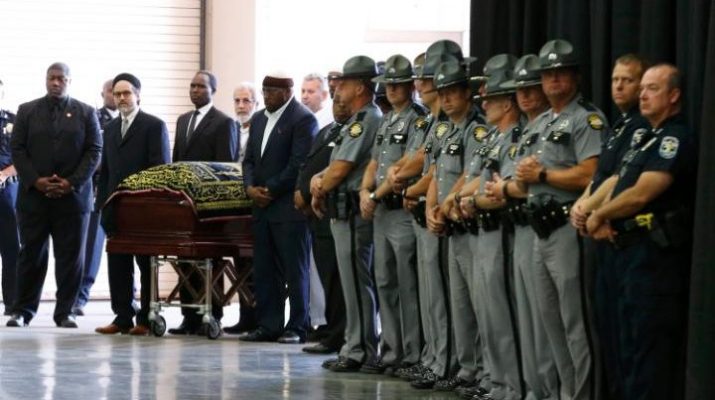Thousands of people streamed into a huge convention center across creeds and nationalities for a Muslim prayer service in remembrance of Muhammad Ali yesterday, the start of a two-day farewell to the beloved boxing legend and civil rights hero.
Men, women and whole families filled the cavernous Freedom Hall arena in Ali’s hometown in Kentucky to pay their tribute before the casket of the 20th century’s most singular personalities, who died last week at age 74.
The brief ceremony in Louisville launched two days of interfaith tributes, bringing together dignitaries and ordinary fans, honouring a man known for both his tenacity in the ring and his social activism outside of it.
“It was fabulous, seeing all the different nationalities, cultures, races, religions come together, even though it’s a very sad situation that he passed, it’s very inspirational,” said Makeeba Edmund, a city employee, who is Muslim.
Muslim men and women prayed in separate rows, most of the latter with their heads veiled.One of those paying his respects was Babacar Gaye, a 54-year-old native of Senegal who remembers watching Ali fights at a house in Dakar as a teenager.
Born Cassius Clay at a time of racial segregation in the American South, the boxer converted to Islam in 1964, changing his name to Muhammad Ali and shocking America.Thursday’s prayer service was held at the site of Ali’s last fight in his hometown, where he defeated Willi Besmanoff on November 29, 1961.
The three-time heavyweight world champion died after a decades-long battle with Parkinson’s disease.
“Muhammad Ali has a very, very special significance for the Muslim community,” Imam Zaid Shakir, who helped organize the prayer service, said earlier.
“This is about… sending him off in the very best of fashion,” said the Muslim cleric, adding that Ali would want his supporters to “honor his memory, live his legacy and love each other.”For millions of Muslims around the world, Ali symbolized the true face of Islam, promoting peace and tolerance.
Semsudin Haseljic comes from a small village in central Bosnia and resettled in Louisville after being injured in the war in 1993. He remembers how the whole community would gather for Ali’s fights — typically broadcast at around 4 am — in one of the two houses in the village with a television set.

